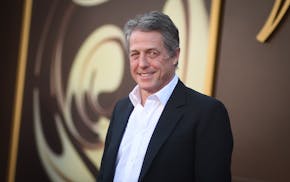When Chris Killingstad joined Tennant Co. in 2002, it wasn't taking full advantage of the highly lucrative market for earth-friendly products.
"I kept asking people why we just made floor cleaning machines," said Killingstad, who became CEO in 2005. "We needed to provide a whole host of products and more fully recognize that the whole sustainability movement was not going away, that it was a megatrend."
Under Killingstad's leadership, the 140-year-old company has pushed itself to grow in the $50 billion market for chemical-free products not only to clean factory floors but also to kill germs in hospitals and food processing plants. The Harvard Business School this year published a case study of Tennant as an example of a mature company reinventing itself.
Chemical-free technology has been a growth engine for Tennant since it rolled out its first product in 2008. Sales of hard-floor scrubbers equipped with its patented ecH2O technology that electronically converts tap water into a cleaning solution have jumped from $17 million in 2008 to $96 million in 2010. Tennant expects sales of ecH2O equipment this year to be $130 million to $140 million, about 20 percent of its total sales.
"They began selling ecH2O at a time when a lot of their customers were doing everything they could to cut back. That's a strong endorsement," said Arnold Ursaner, an analyst at CJS Securities in White Plains, N.Y.
Ursaner said it's especially impressive because ecH2O equipment is priced 10 percent to 20 percent over Tennant's conventional equipment. The company markets customers on financial payoffs of the chemical-free machines, which it says pay for themselves within 18 months. Customers replace equipment about every five years.
Tennant is working to make its sustainable footprint even larger. It is rolling out a second product, the Orbio 5000sc, with a different technology that electronically restructures softened tap water and a small amount of salt into a cleaning agent. The water can be stored and dispensed into all of kinds of cleaning equipment for carpeting, walls, shelves, windows and other surfaces.
The Orbio 5000sc was developed by Orbio Technologies, a business unit formed by Tennant two years ago, and Aramark. The professional services giant is using it with clients such as Chicago's McCormick Place, the nation's largest convention center.
A third technology still in early stages of commercialization converts water to a solution that kills staph, E. coli and other bacteria. Rogers-based Activeion licensed the technology for use in spray bottles, but Tennant is exploring ways to expand it into a variety of markets like health care and food processing.
Tennant's pursuit of sustainability has the potential to give the company an entirely new identity, said Kevin Bolen, a partner in Innosight, a Boston-based consulting firm that worked with the company: "I can envision a time when it will cease to be known as a leading manufacturer of floor scrubbers that also has ecH2O and become 'the chemical-free cleaning solutions company that also makes great floor scrubbers.'"
The Harvard study's author, Lynda Applegate, declined interview requests. David Bartlett, a senior lecturer at the University of Minnesota's Carlson School of Management, said he has used the study to illustrate "the ability of a midsized, publicly traded, old economy-type manufacturing company operating in a tough economic environment to commit scarce resources to innovative technologies."
Tennant doesn't have a wide following on Wall Street, a circumstance Joe Maxa, analyst at Dougherty & Co. in Minneapolis, attributes to its niche industry of industrial maintenance.
"If the company continues to do well with new water-based technologies, it is likely to attract additional investor interest," Maxa said.
Some investors already have taken notice. Tennant stock has risen 35.5 percent in the last two years. Tennant shares fell 6.3 percent on Tuesday after the company reported healthy third-quarter sales and earnings gains but lowered the bottom range of its full-year earnings forecast. Even so, the stock is up 16.9 percent from a year ago.
Groundwork for Tennant's sustainable strategy began under former CEO Janet Dolan, who created an advanced product development group to explore new ventures. Under Killingstad, the group received 10 percent of the company's total research and development budget to find technologies that would move Tennant into environmentally friendly cleaning and "get the company off the floor," Killingstad said.
After Killingstad became CEO, an advanced product group scientist discovered the electronically converted water technology on a visit to Japan, where it was being used in a limited way. A year after launching ecH2O, Tennant formed Orbio Technologies to give the advanced product group more autonomy.
"We knew we were onto something with ecH2O but also recognized that if we tried to develop within the mother ship of Tennant it would get lost," Killingstad said. "People who have spent their careers here have a traditional way of seeing the Tennant business. There are quarterly pressures to deliver results. This technology we knew would take time to really develop, and we were afraid it would get short shrift."
Orbio established its home in what Killingstad calls "a glorified garage" about five miles from Tennant headquarters. The business unit has its own staff of scientists, engineers and marketing researchers and a board headed by Killingstad. It also has its own research and development budget, whose amount he declined to disclose. Tennant has said it boosted research and development spending primarily to fund Orbio.
Innosight's Bolen said companies like IBM and Intel have developed new business opportunities the same way, through autonomous branches. "The unit can 'borrow' what it needs from the core organization but isn't held to the same strict rules and financial metrics," he said. Orbio can tap Tennant's manufacturing capabilities, technical service staff and worldwide sales force.
Tennant's well-established presence has helped it persuade existing customers to adopt the new cleaning technologies. "This is a relatively conservative industry, where new things are not always readily accepted, especially when they're initially going to cost more," Killingstad said.
But about half of ecH2O customers are new, something Killingstad believes explains competitors' complaints that Tennant's chemical-free products don't clean any better than plain tap water. One recently sued Tennant, alleging its claims are false and misleading. Tennant has rejected the suit's assertions.
Maxa notes that Tennant can point to several customers satisfied with the chemical-free products. That includes Aetna Building Maintenance of Columbus, Ohio, which provides cleaning and other services to factories, office buildings and colleges in six Midwestern states. Aetna uses both ecH2O floor scrubbers and the Orbio 5000sc dispenser. President Paul Greenland said Aetna believes the activated water can clean as well as chemicals, depending on the job. In some settings it's better because it doesn't leave a residue, he said.
About 20 percent of Aetna's clients use the chemical-free products. "Sometimes it takes some convincing," Greenland said. "Some people have a hard time believing a glass cleaner will work unless it's blue."
Susan Feyder • 612-673-1723
Georgia's parliament votes to approve so-called 'Russian law' targeting media in first reading
Jill Biden says an agreement to let federal employee military spouses work from overseas is overdue

An NPR editor who wrote a critical essay on the company has resigned after being suspended
